Skin: The body’s overworked defense system
Your skin is your window to wellness!
You’ve often heard me say that “Skincare is healthcare.” That’s because your skin is your body’s largest organ—making up about 16% of your physical weight! Your skin is literally your front line of defense against hot, cold, wind, dehydration, chemicals and environmental toxins, bacteria, viruses, fungi, and all manner of invasive organisms. Your skin is what keeps you all together and provides the interface between you and the world.
Your skin not only protects other organs from a potentially hostile environment (imagine what would happen to your heart and lungs on a hot day, for example, if your skin wasn’t keeping them from getting cooked and drying out), your skin also provides external indications of what is going on internally. Yellow, jaundiced skin, for example, is an indicator of liver problems. Blue or purple discolorations, particularly on the extremities, can indicate heart problems. (For 12 indications of heart disease that show up on your skin, click here.) Dark rings around the neck or other folds of the skin could indicate polycystic ovarian syndrome, liver problems, or a fungal infection. Breaking out in hives likely indicates you ate something you are allergic to. There are at least 35 internal cancers for which the presenting signs and symptoms are skin conditions.
Your skin can provide this effective defense and early warning system because it is intimately connected with every other part of you. The neuro-immuno-cutaneous-endocrine (NICE) system is an intricate network that links your nervous system, immune system, cutaneous (skin), and endocrine system, all of which are important to physical, emotional, and mental health.
Of course, the outside world is not entirely threatening, so the function of skin is not entirely defensive. Skin is also our primary sense organ for experiencing touch—which can comfort us, invigorate us, delight and inform us—as well as warn us of dangers that can cause pain. So it’s in our best interest to keep skin healthy and functional, able to serve us for a long time.
Unfortunately, our skin thins and weakens as we get older, making us more vulnerable to external threats and pathogens. And even when we’re young, our skin can be thwarted in performing its defensive duties by stress, allergens, eczema, soap, chemicals, sunburn, and excessive dryness. That’s why protecting and caring for our skin is important at any age.
To better understand why, consider the structure of the skin. Though the skin may appear to be thin and “superficial,” a closer look reveals its depth and complexity. (See illustration to the right.)
Skin is made up of three layers:
The deepest layer contains connective tissue and fat and provides insulation, stores energy, and absorbs shock.
The middle layer (the dermis) is responsible for 90 percent of your skin’s thickness. It contains collagen and elastin, conferring strength, flexibility, and elasticity to the skin. The dermis also contains blood vessels, nerves, oil and sweat glands, and hair follicles. Thin-skinning is the result of the thinning of the dermis—typically due to the decline in collagen production as we age, but also reflecting water loss from damage to:
The outermost layer (the epidermis). This is the skin’s (and the body’s) protective barrier. The epidermis includes five different layers of its own, the cells of which are constantly rising to the surface, which is called the stratum corneum.
This outermost layer—the stratum corneum—is made up of dead, flat, protein-filled cells that combine with fat and water to create a sort of tile-and-grout matrix. This matrix is what keeps moisture in the body and protects us from outside forces, including toxins, ultraviolet rays, and bacteria. It’s where the “rubber meets the road” in terms of the body’s defenses.

Unfortunately, age, the elements, illness, and even washing with soap can damage and weaken the stratum corneum. Dry, thin skin is more permeable than plump, healthy skin, and can crack or tear easily, like tissue paper. Perhaps more important, thinner, weaker skin is a much less effective hydration barrier, compounding the “natural” loss of cellular water over time.
Aging is the most common culprit: a lifetime “on the front lines” takes its toll on our skin. Women, in particularly, experience thinning skin as they age—particularly in areas that have been sun exposed, or even sun damaged. Men are somewhat protected by their higher levels of collagen.
For both men and women, older skin tends to lose its water content. The skin loses its plumpness and structural integrity, resulting in sags and shifts, and weakening the skin’s ability to defend the rest of the body.
Sun damage is the second leading cause of damage to the skin barrier, including various types of skin cancer—the most serious of which is melanoma.
Other threats to your skin’s defensive functions include:
Allergens, which spark an inflammatory response in the skin, resulting in eczema (atopic dermatitis) and other skin reactions.
Stress, which aggravates allergic, inflammatory, and autoimmune skin conditions like psoriasis.
Medications, particularly steroids (topical, oral, or inhaled), aspirin and NSAIDs (like Ibuprofen and Aleve), and prescription blood thinners.
Lifestyle choices, such as smoking, alcohol consumption, UV exposure, lack of exercise, poor diet (too much sugar and refined carbohydrates; too little fresh fruits and vegetables), and
Poor skincare. Too many of us think of skincare as superficial or related only to our appearance, when we really need to appreciate our skin as a highly sensitive, finely tuned organ that is working 24 hours a day to protect us from outside forces and to advise us of internal conditions. In order for skin to take proper care of us, we need to take proper care of our skin!
Hydration is the key to bolstering your body’s defense system.
Minimizing sun exposure and using sunscreen and moisturizer DAILY are the two most important steps you can take to maintain your skin as a defense system. You should also:
Eat your water. Healthy skin begins at the cellular level and, like every other body part, is maintained from the inside-out. A diet that emphasizes moisture-rich foods such as fresh fruits and vegetables, whole grains and legumes, embryonic foods like eggs, seeds, and nuts, and healthy fats and oils, such as the Omega-3s is essential. I also recommend supplements to support cell membrane health (membranes are what keep water where you want it—inside the cells), including lecithin.
Exercise. Muscle, being 70% water, helps your body stay hydrated over time.
Manage your stress. Chronic, cultural stress leads to chronic inflammation, which can overwhelm your body’s ability to repair itself. That includes its ability to repair your skin.
#ModernWellness #ConqueringCulturalStress #MuradSkincare
DISCLAIMER: The information provided on this site is intended for your general knowledge only and is not a substitute for professional medical advice or treatment for specific medical conditions. You should not use this information to diagnose or treat a health problem or disease without consulting with a qualified healthcare provider, who should also be consulted with any questions or concerns you may have regarding your condition.
